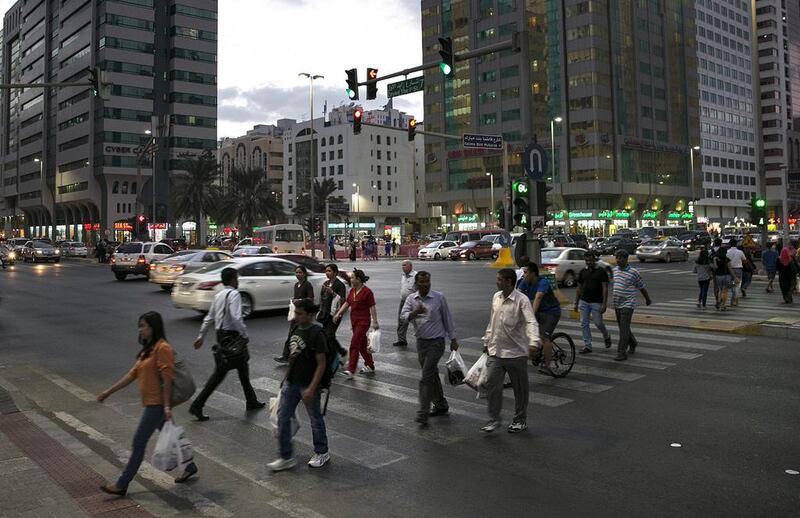ABU DHABI // As the population of Abu Dhabi continues to rapidly expand, its services and infrastructure will come under increasing pressure.
The population of the emirate rose to 2,657,026 mid last year, according to new estimates by the Statistics Centre.
There was an increase of more than 300,000 new residents, from 2.33 million in 2012.
Just over half of these – 51.7 per cent – live in Abu Dhabi city, 42.5 per cent in Al Ain, and 5.8 per cent in the Western Region.
Dr Rima Sabban, an associate professor of sociology at Zayed University, said: “This general increase is basically through migration. It’s not your usual type of growth that is naturally happening. It is recognised worldwide that countries that are economically growing and developing, require an influx of people, and the UAE can’t produce that sufficiently so people have to come from outside. The numbers are a mere reflection of this need.”
Dr Sabban said an increase in the population also resulted in an economic boom that can bring in new challenges, such as inflation and social-integration issues.
Musa Mohamed, 31, moved to Abu Dhabi from India this year to start work as an accountant in a construction company. He soon faced the challenges of the increasing cost of living in the UAE.
“I like working here, but I question if I should move my family to the UAE or not,” he said.
“Prices are increasing. Rents are not stable and I’m not sure what the future might hold. School fees seem to be increasing as well. There’s so much to think about when moving here now.
“It’s no longer an easy choice. It might be easier for me to work here and support my family in India, than move them here.”
The Ministry of Energy is expected to announce a new pricing structure for petrol and diesel today, after a new policy of deregulation was announced.
“Driving is affordable in the UAE, but it might not be any more. I understand that it will reduce the number of cars on the road, but one will need to factor in the use of public transport as a new way of life,” Mr Mohamed said.
Dr Martin Hvidt, a professor of economics at Zayed University, said more needed to be done to understand the preliminary statistical changes in the population of the capital.
“If everyone is employed, and they usually are because the UAE doesn’t let people in without work permits, this will improve the economy, but it can add to congestion on the roads and other issues. If the increase in numbers is mostly seen in foreign workers housed in camps outside the city, then the effect of that cannot be largely seen on the city as a whole.
“Professional people renting in the city can contribute to an increase in housing costs because of more demand. They’d also be buying into more services, improving and adding to the economic boom that we see,” Dr Hvidt said.
Preliminary estimates from the middle of last year also show that the non-citizen population was 2,150,615, representing 80.9 per cent of the emirate’s population.
The Emirati population of Abu Dhabi is 506,411, representing 19.1 per cent of the population.
Khalfan Al Dhaheri, 25, an Emirati from Baniyas, commented on UAE nationals making up 19 per cent of the city, and said: “I don’t know what it would feel like if the country was made up of mostly Emiratis.
“This is the UAE as we know it. It’s a country with global ambitions and a cosmopolitan feel to it. We like to welcome the world and it has been working very well for us.”
nalremeithi@thenational.ae






